Chapter 1.8 Voyaging Towards Excellence
Chapter 1.8 Voyaging Towards Excellence
Textbook Questions and Answers
Question 1.
There are different ways to travel from one place to another for different purposes. Discuss with your partner and match the words given in table A with their meanings in table B: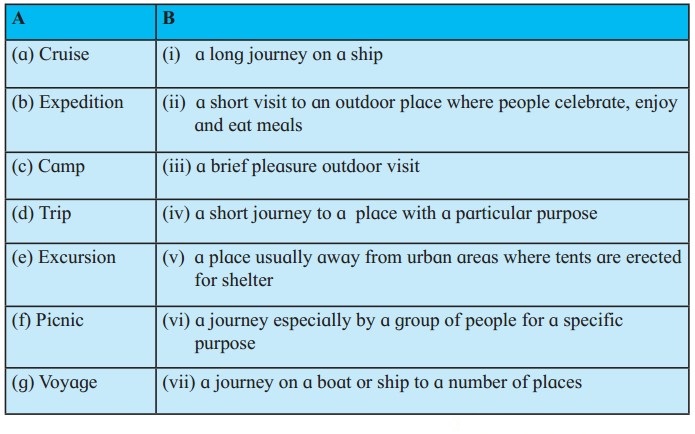
Answer:
(a) Cruise – a journey on a boat or ship to a number of places
(b) Expedition – a journey, especially by a group of people, for a specific purpose
(c) Camp – a place usually away from urban areas where tents are erected for shelter
(d) Trip – a brief pleasure outdoor visit
(e) Excursion – a short journey to a place with a particular purpose
(f) Picnic – a short visit to an outdoor place where people celebrate, enjoy and eat meals
(g) Voyage – a long journey on a ship
Question 2.
Discuss the following with your partner and complete the web.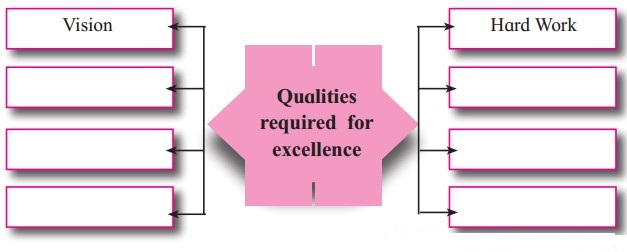
Answer:
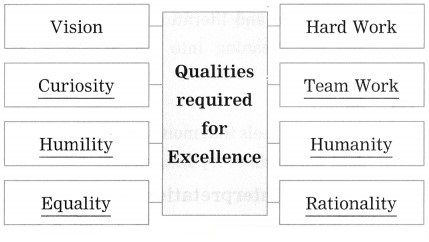
(A1)
Question (i)
Upbringing plays a very important role in shaping one’s life.
Answer:
The teacher will form two groups in the class. One group will speak in favour of the above topic while the other will speak against it. Debate brings out different perspectives, it does not mean one is right and other is wrong. You can take help of the following points and have a debate on it:

(A2)
Question (i)
Make a list of great Indian and foreign personalities who had a great impact on Achyut Godbole during his childhood.
Answer:
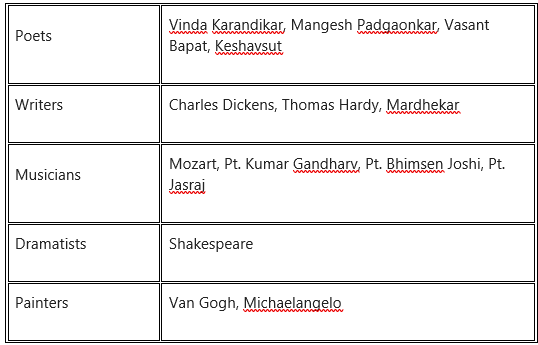
Question (ii)
Find the different techniques used by the writer to learn Science and Mathematics.
Answer:
The different techniques used by the writer to learn Science and Mathematics are:
(a) The writer used to appreciate the inherent beauty of these subjects.
(b) He found Newton’s law of motion beautiful and the Pythagorean Theorem elegant.
(c) The writer loved solving problems of Mathematics of the 9th standard when he was in the 7th.
(d) He used to love solving problems and used to enjoy finding out the most elegant method of solving them, even though I they were not a part of the curriculum.
Question (iii)
The writer faced numerous problems while communicating in English because-
Answer:
(a) He had his entire education in Marathi.
(b) His vocabulary was very weak, and pronunciation was terrible.
(c) His construction of sentences was very awkward.
Question (iv)
The writer was completely stumped because his:
Answer:
(a) vocabulary was very weak
(b) spoken English was quite pathetic
(c) pronunciation was terrible
(d) construction of sentences was very awkward
Question (v)
Due to the writer’s pathetic English speaking style, he:
Answer:
(a) felt quite lonely and terrified, in Mumbai in general, and IIT in particular.
(b) developed an inferiority complex
(c) felt depressed and diffident.
(d) wanted to run away from IIT and even Mumbai.
Question (vi)
Complete the following. The writer wanted to achieve mastery in English because-
Answer:
(a) he wanted to speak excellent, elegant and fluent English
(b) he would be able to achieve excellence and excel in anything he tried to do
(c) he need not have to feel afraid of anybody and start feeling at home in his hostel.
Question (vii)
Make a list of different steps that the writer undertook to improve his English speaking skills.
Answer:
To improve his English the writer:
(a) decided to also think in English before speaking in English.
(b) started reading English newspapers and English novels.
(c) studied etymology and phonetics and studied the roots of the words and how to pronounce them.
(d) used to stand in front of the mirror and practice speaking, realising his mistakes and correcting them himself all the time and improvising and improving day by day.
Question (viii)
Describe the writer’s achievements after achieving mastery over the English language.
Answer:
After achieving mastery over the English language:
- His fear for English disappeared.
- He started feeling quite confident about speaking in English at length with anybody.
- He started feeling at home in his hostel.
- He could give presentations with ease.
- He negotiated and signed many contracts worldwide and ran large global software companies.
- He headed software companies having thousands of software engineers worldwide.
Question (a)
Complete the table comparing the two different phases of the life of the writer- as an MD or Chief Executive Officer and an activist of Sarvodaya movement.
Answer:
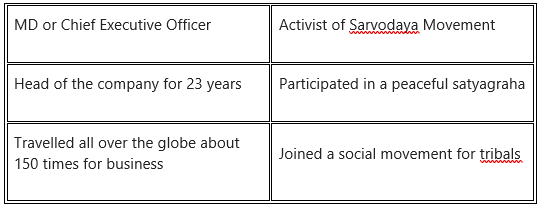
Question (ix)
Complete the web highlighting the various opportunities you gained due to your good English speaking skills.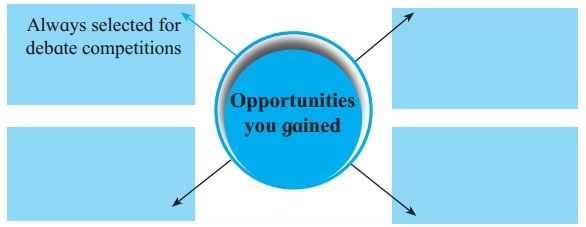
Answer: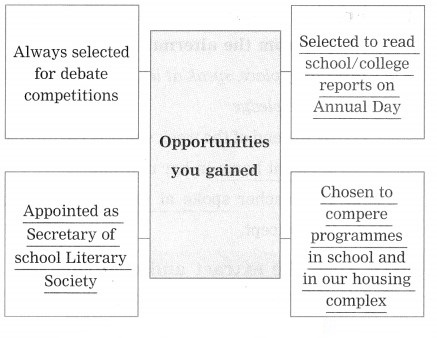
Question (a)
Describe a situation or incident when you felt embarrassed for your lack of knowledge of a particular subject or incompetence in speaking English fluently.
Answer:
This happened after my Std X exams. I live in Latur, and I was visiting my cousins in Mumbai for the first time. In order to entertain me, they took me to a musical nite. Unfortunately, it was music show based on English songs, and I had no knowledge of it or interest in it. I love to listen to Hindi and Marathi songs only. They soon realized my lack of interest, and were sorry for their mistake. I was embarrassed about my complete lack of knowledge about English music.
(A3)
Question (i)
Fill in the blanks selecting the correct phrase from the alternatives given.
(feel out of place, speak at length, feel at home, sea of knowledge)
(a) By the end of the week she was beginning ………………… in her new job.
(b) When he lost his mother he was completely ……………… .
(c) Travelling can help to ………………….. .
(d) After my retirement I started ……………… as a social worker.
(e) Having faith in God ……………………. in difficult situations.
(f) To succeed in any competitive examination, one requires a sea of knowledge.
(g) The simple village girl ……………………. in a formal party.
(h) The work done by Sindhutai Sapkal …………………. of millions
(i) The teacher …………………….. explaining the concept.
(j) The speaker was ……………………… by the intelligent questions asked by the audience.
Answer:
(a) By the end of the week she was beginning to feel at home in her new job.
(b) When he lost his mother he was completely broken.
(c) Travelling can help to broaden one’s horizon.
(d) After my retirement I started my second innings as a social worker.
(e) Having faith in God keeps one going in difficult situations.
(f) To succeed in any competitive examination, one requires a sea of knowledge.
(g) The simple village girl felt out of place in a formal party.
(h) The work done by Sindhutai Sapkal touched the hearts of millions
(i) The teacher spoke at length explaining the concept.
(j) The speaker was completely stumped by the intelligent questions asked by the audience.
Question (ii)
Find out a word related to the game of cricket. List two meanings for it.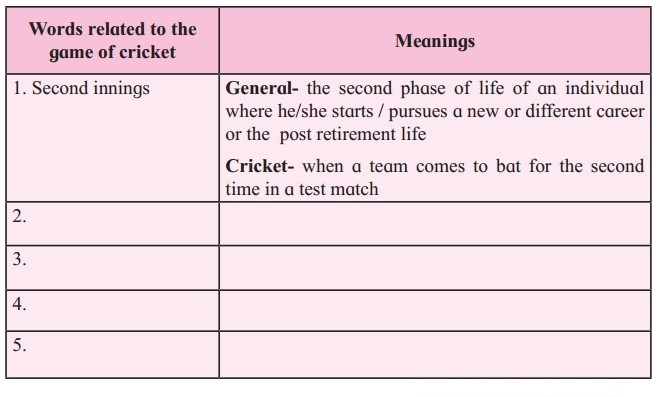
Answer:
Second innings:
1. general meaning: the second phase of life of an individual where he/she starts/ pursues a new or different career or the post retirement life.
2. related to cricket: when a team comes to bat for the second time in a test match
Question (iii)
Go through the text to find the antonyms of the words given in the grid and fill in the boxes. One is done for you.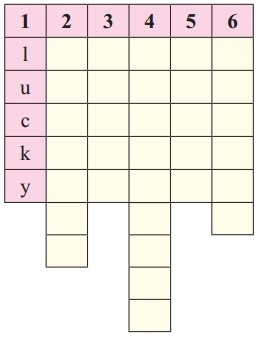
Answer: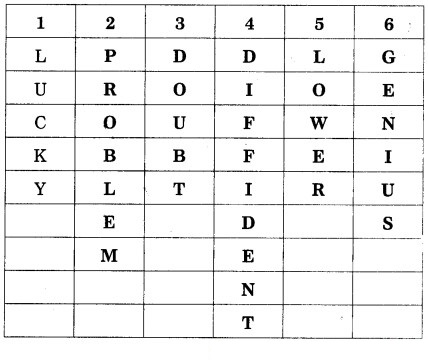
(A4)
Question (i)
Write whether the underlined verbs in the following sentences are Main verbs or Primary auxiliary verbs:
(a) I had a very simple upbringing. ………………
(b) I was immensely impressed. ………………..
(c) I had learnt from my childhood that money did not mean everything in life. …………………
(d) He was a convent educated guy. ……………….
(e) They did all the work in time. …………………..
(f) I had to achieve a lot in life. …………………….
Answer:
(a) Main verb
(b) Main verb
(c) Auxiliary verb
(d) Main verb
(e) Main verb
(f) Main verb
Question (a)
Fill in the blanks with appropriate modals according to the situations given in the following sentences:
Answer:
- Take an umbrella. It might rain later.
- People must not walk on the grass.
- Could I ask you a question?
- The signal has turned red. You ought to wait.
- I was a sportsperson in my school days. I can play badminton.
- I am going to the library. I will find my friend there.
Question (b)
Find from the extract, the sentences that show past habit.
Answer:
1. Poets like Vinda Karandikar, Mangesh Padgaonkar and Vasant Bapat used to visit our home.
2. They used to talk about Keshavsut…
(iii) Do as directed and rewrite the sentence:
Question (a)
I did not fully understand their discussions but I was immensely impressed. (Remove ‘but’.)
Answer:
Though I did not fully understand their discussions, I was immensely impressed.
Question (b)
I had decided that I would do nothing of this sort. (Remove ‘that’.)
Answer:
I had decided to do nothing of this sort.
Question (c)
My fear had vanished and I started feeling at home in my hostel. (Use ‘when’.)
Answer:
When my fear had vanished, I started feeling at home in my hostel.
Question (d)
It was only my self-esteem which stopped me. (Remove ‘which’.)
Answer:
Only my self-esteem stopped me.
Question (e)
I plunged into all these branches of knowledge. It was a period of renaissance.
(Join with ‘which’.)
Answer:
I plunged into all these branches of knowledge, which was a period of renaissance.
Question (f)
When I look back, there are a number of lessons that I cherish. (Remove ‘When’.)
Answer:
On looking back, I find that there are a number of lessons that I cherish.
Question (g)
There are hundreds who tell me that they understood the theory of relativity. (Remove ‘who’.)
Answer:
Hundreds tell me that they understood the theory of relativity.
(A5)
Question 1.
Go through the sample of the flyer given on page 91 of the textbook and prepare flyers on the topics given below.
Topics :
1. Yoga Class / Summer Hobby Class
2. Tree Plantation Drive
3. Cleanliness Drive
4. Help us to end Child Labour
5. Let’s get rid of the monsters – tobacco and alcohol
Use the following points:
- Details
- Special Features
- Why to choose us/Need of drive/Purpose of the mission
- Anything special
- Add your own points
Answer:
1. Yoga classes:
Divine Yoga Classes
First Floor, Vijai Towers, Opposite Railway Station, AAahim (West)
We have classes for all : from age 5 to 75 Men and women, girls and boys.
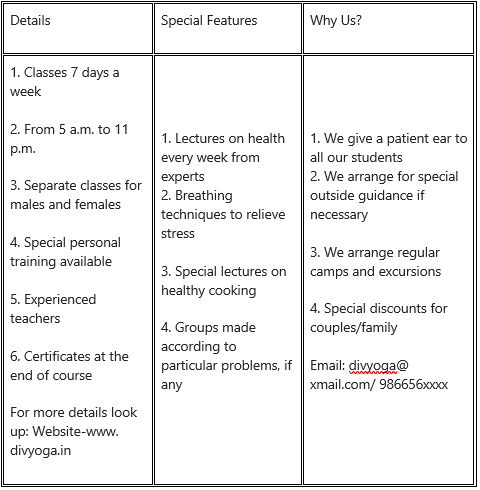
(A6)
Question 1.
Achyut Godbole has written many bestsellers that are famous far and wide. Read at least two books of your choice, make a summary of those books and submit.
(Students may attempt this on their own.)
Important Questions and Answers
Read the extract and complete the activities given below:
Global Understanding:
Question 1.
Write if the following sentences are True or False. Rewrite the false sentences correctly:
1. The writer did not like Mathematics and Science.
2. The writer studied Mathematics and Science only for scoring maximum marks in exams.
3. The writer’s skill at solving problems helped him in his IIT entrance exam.
4. The writer scored 100% marks in Mathematics in every examination he appeared for.
Answer:
True sentence:
3. The writer’s skill at solving problems helped him in his IIT entrance exam.
False sentences:
1. The writer did not like Mathematics and Science.
2. The writer studied Mathematics and Science only for scoring maximum marks in exams.
4. The writer scored 100% marks in Mathematics in every examination he appeared for.
Corrected sentences:
1. The writer loved Mathematics and Science.
2. The writer studied Mathematics and Science not only for scoring maximum marks in exams, but also because he appreciated their inherent beauty.
4. The writer scored 100% marks in Mathematics in almost all the examinations he appeared for.
Question 2.
The writer’s joy was shortlived. Give reasons.
Answer:
In Solapur, where the writer spent his childhood, he had not seen any building which was more than three – storeyed. Mumbai however was full of skyscrapers, which made the writer uncomfortable. At IIT, most of the students and professors used to converse in English whereas the writer’s English was very poor, with a weak vocabulary, terrible pronunciation and very awkward construction of sentences.
Due to all this, he felt quite lonely and terrified in Mumbai in general and IIT in particular. He developed an inferiority complex and wanted to run away from IIT and even Mumbai. Thus, his joy at getting into IIT was shortlived.
Question 3.
Name the following from the extract:
Answer:
- Management gurus : Alvin Toffler, Peter Drucker, C. K. Prahlad, Tom Peters
- The founder of Infosys: Narayan Murthy
- Two universities: Harvard, MIT (Massachusetts Institute of Technology)
- A great technologist-Vincent Serf
Question 4.
Pick out the false sentences and rewrite them correctly:
1. The writer was more intelligent and well- j read than his friends.
2. The writer’s group was interested in many things.
3. The writer wanted to top the GRE and migrate to the U.S.
4. The writer possessed many books on various topics.
Answer:
False sentences:
1. The writer was more intelligent and well- read than his friends.
3. The writer wanted to top the GRE and migrate to the U.S.
Corrected sentences:
1. The writer’s friends were more intelligent and well-read than the writer.
3. The thought of topping the GRE and migrating to the U.S. never even touched the writer’s mind.
Question 5.
Complete the web: (the first letter of each quality has been given)
Answer:

Question 6.
Complete the web stating the principles of good management:
Answer:
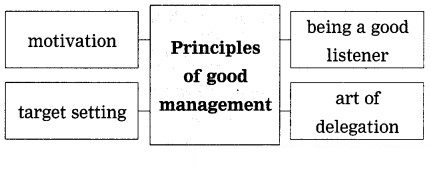
Question 7.
What was the writer’s first love?
Answer:
to read and write on various subjects concerning human life and existence.
Question 8.
How many books has the writer written in Marathi?
Answer:
about 34 books
Question 9.
What was the name of the writer’s autobiography?
Answer:
Musafir.
Question 10.
Name any two values that the writer cherishes.
Answer:
humility, humanity
Complex Factual:
Question 1.
Give the writer’s opinion about:
arts, music and literature.
Answer:
The writer says that the arts are equally, if not more, important in our lives than science and technology. He also feels that arts, music and literature enrich our lives and put meaning into our existence. He loved music.
Question 2.
money.
Answer:
The writer feels that money is necessary, but does not mean everything in life.
Question 3.
List the achievements of the writer in Mathematics.
Answer:
1. The writer loved solving problems of Mathematics of the 9th standard when he was in the 7th.
2. The writer scored 100% marks in Mathematics in almost all the examinations that he appeared for, from the 1st standard until IIT, barring only a few times. He also stood 1st in the University in all subjects put together.
Question 4.
Describe the ‘very important’ thing that happened to the writer.
Answer:
When the writer was in his third year at IIT, he came in contact with about 15-20 extremely brilliant students/researchers/ professors from IIT, TIFR and BARC. They included top-ranking students from IIT, visiting professors in American Universities, very renowned mathematicians of the world and so on. This friendship had a lasting impression on his life. He came to know what real brilliance meant, and where he stood with regard to it.
Question 5.
Describe curiosity and humanity.
Answer:
Curiosity is important. It is only because of the human curiosity that we have been able to make such a great progress in science and technology, and social sciences. Humanity means concern for our fellow human beings; it means caring for and helping others whenever and wherever possible. This is important if we wish to live in a world that is happy and contented.
Question 6.
List the things that the writer said he learnt while running large companies.
Answer:
While running large companies the writer learnt:
- The importance of teamwork
- The necessity of leading from the front and setting a good example for the staff.
- The need to treat subordinates and colleagues as friends.
Question 1.
Match the subjects in Column A with the title of the books in Column B:
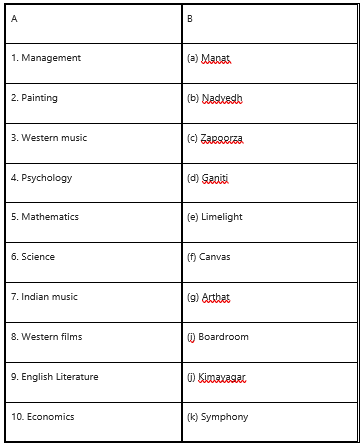
Answer:
- Management – Boardroom
- Painting – Canvas
- Western music – Symphony
- Psychology – Manat
- Mathematics – Ganiti
- Science – Kimayagar
- Indian music – Nadvedh
- Western films – Limelight
- English Literature – Zapoorza
- Economics – Arthat
Inference/Interpretation/Analysis:
Question 1.
‘Nevertheless, culturally I had a rich childhood’. Explain the statement with reference to the extract.
Answer:
The writer says that he had a very simple upbringing in a lower middle-class family which did not have even basic amenities like a fan, refrigerator, etc. Even so, it was rich culturally because various poets, writers and musicians used to visit their home and there would be hours of discussions about music, literature, paintings, sculptures, etc. Famous writers, painters and musicians were discussed and this made the writer love the arts. He states that arts, music and literature enrich our lives and put meaning into our existence.
Question 2.
Complete the following:
The writer developed a problem-solving attitude because …………….
Answer:
The writer developed a problem-solving attitude because ……………..
1. He did not study subjects only for scoring maximum marks in the examinations.
He used to study these subjects or any subject for that matter for its inherent beauty.
2. He used to love solving problems andused to enjoy finding out the most elegant method of solving them.
3. He used to get involved in solving them.
Question 3.
Complete the following:
The writer was benefitted by the discussions with great people as it…
Answer:
- made a lasting impact on his life
- made him realize what real brilliance meant
- broadened his horizons, and his aims and worldview became global
- taught him a lesson in humility, hard work and a passion for excellence.
Question 4.
Explain why the author say that passing the ‘examination of life’ is more important than passing the college examination.
Answer:
The writer wished to understand the world and how it works. He also wished to serve India and her people. To do this, he would have to read and understand different branches of knowledge, to develop values like humility, humanity and rationalism. This was the ‘examination of life’ for him. This was far more important to him than just passing the IIT examination.
Question 5.
Mention a few ways in which the author touch the hearts of the people.
Answer:
The author’s books have brought about very good changes in the lives of thousands of readers. Hundreds have come out of depression and more than a dozen have given up thoughts of committing suicide and decided to start all afresh. There are hundreds who say that they understood the theory of relativity or Big Bang after reading his book on Science ‘Kimayagar’.
His book ‘Boardroom’ on Management has created at least 20 successful entrepreneurs. Then there are hundreds who can understand Economic Times or NDTV Profit after reading his book on economics ‘Arthat’.
Many have turned to Mathematics after reading his book ‘GanitV. The same is true about his books on Indian Music (Nadvedh), English Literature (Zapoorza), Painting (Canvas), Western Films (Limelight) and Western Music (Symphony) or books such as ‘Genius’ series, ‘Rakta’ or ‘Vitamins’ or ‘Anartha’. It is these reactions of thousands of readers that made him feel that has touched the hearts of thousands of people.
Question 6.
Describe the second innings of the writer in your own words.
Answer:
After working for software companies for many years, the writer wanted to return to his first love, i.e. reading and writing on various subjects concerning human life and existence. Therefore, he gave up two lucrative offers to become a writer. This is how his second innings as a writer in Marathi began. After this, he wrote about 34 books in Marathi. Most of them became bestsellers with tens of thousands of copies sold for each. These books brought about very good changes in the lives of thousands of readers.
Hundreds came out of depression and more than a dozen gave up thoughts of committing suicide and decided to start all afresh. Thousands more have been helped in the fields of science, economics, music, mathematics, etc. by the writer’s books. It is these reactions of thousands of readers and the feeling that he is touching their hearts that has kept him going.
Personal Response:
Question 1.
Describe what a ‘rich childhood’ mean to you.
Answer:
I think that a rich childhood is one where you get a lot of love and security at home. It could also be culturally rich, where you get to read or know music/books/theatre, etc. Basically, a rich childhood is one which has plenty of love, fun and friends. Money is secondary.
Question 2.
We should study any subject. Do you agree? Give your reasons.
Answer:
Every subject has its own inherent beauty and uses. We should study a subject because of its beauty. While Science and Technology are important to make our daily lives easy, arts, music and literature enrich our lives and put meaning into our existence. Every subject helps in some way in the progress of mankind.
Question 3.
Do you think that speaking English fluently and confidently is important? Discuss.
Answer:
Yes, it is. English is an international language, which the people of most countries understand. If we wish to go abroad, or have international exposure, we should know English in this competitive world. Even in India, knowledge of good English gives us a sense of confidence. It helps us to get jobs. It also helps us to get access to information from all parts of the world.
Question 4.
Name some of the top universities in the world.
Answer:
Some of the top universities in the world are: Harvard University, Stanford University, Massachusetts Institute of Technology, Oxford University, Cambridge University, Cornell University. Princeton University, etc.
Question 5.
Do you feel that arts, music and literature enrich our lives. Discuss.
Answer:
Art is all around us; it surrounds us. It provides us with a deeper understanding of our own emotions and those of others. It makes us more sensitive, softer and gentler. It enriches the quality of life and improves our physical and mental health. It connects us to others. Literature gives us an insight into the world of others, both in the present and the past.
Question 6.
Do you think that team work is important today? Explain with an example.
Answer:
Yes, today team work is very important in every sphere, whether it is in games or at work. Every individual has different talents and these separate talents come together when one is in a team. For example, in cricket, one person may be a good bowler, another a good batsman, a third a good fielder, etc. When all these people come together and play the game as a team, it leads to success. In an office too, only when we work in a team and contribute our respective talents can we complete projects.
Question 7.
Do you think passion is more important than wealth?
Answer:
Passion is certainly more important than wealth. Wealth can give the luxuries of life, but it cannot give mental peace and satisfaction. This can only be gained by having an interest in what we do, or in simple words, by loving our jobs. Hence, when one chooses a career, it is more important to choose one which we love rather than one which pays more.
Language Study:
Question 1.
Find from the extract, the sentences that show past habit.
Answer:
1. I used to study these subjects or any subject for that matter for its inherent beauty.
2. I used to get involved in solving them.
3. I used to love problem-solving and used to enjoy finding out the most elegant method of solving them.
Question 2.
These problems were not a part of the curriculum, but I enjoyed the whole process. (Rewrite using ‘though’.)
Answer:
Though these problems were not a part of the curriculum, I enjoyed the whole process.
Question 3.
This exam is completely based on your problem-solving ability and the ability to think not only logically but quickly and rapidly. (Pick out the adverbs of manner.)
Answer:
completely, logically, quickly, rapidly
Question 4.
Find from the text, the sentence that show past habit:
Answer:
Most of the students and professors used to converse in English.
Question 5.
Find from the extract, a sentence that shows past habit.
Answer:
I used to stand in front of the mirror and practise speaking.
Question 6.
I wanted to speak excellent, elegant and fluent English. (Rewrite using ‘that’.)
Answer:
I wanted to speak English that was excellent, elegant and fluent.
Question 7.
My fear had vanished and I started feeling at home in my hostel.
(Pick out the verbs and state the tense.)
Answer:
had vanished – past perfect tense; started – simple past tense
Question 8.
Find from the extract,the sentences that show past habit.
Answer:
1. Until that time I used to consider myself somewhat intelligent.
2. I used to visit MIT during lunch time to meet my friends.
3. I used to visit both of these Universities.
4. If you walked for an hour from there, you could reach Harvard Square near Harvard University. (Pick out the clauses and state their type.)
Answer:
you could reach Harvard Square near Harvard University-Main clause
If you walked for an hour from there- Subordinate adverb clause of condition
Question 9.
All the discussions with these greats broadened my horizon.
(Rewrite beginning ‘My horizon…………’)
Answer:
My horizon was broadened by all the discussions with these greats.
Question 10.
Find from the text, a sentence that show past habit.
Answer:
We used to discuss about relativity, Big Bang, aesthetics, literature, philosophy, economics and many other subjects every day until late into the nights.
Question 11.
I learnt these values during my IIT days.
(Rewrite beginning ‘These values’.)
Answer:
These values were learnt by me during my IIT days.
Question 12.
It is very difficult to become a master or an expert in all these subjects. (Rewrite using ‘not’.)
Answer:
It is not at all easy to become a master or an expert in all these subjects.
Question 13.
I made a few mistakes, but learnt a lot about motivation. (Rewrite as a complex sentence.)
Answer:
Though I made a few mistakes, I learnt a lot about motivation.
Question 14.
I learnt a lot of things when I was running these large companies.
(Pick out the subordinate clause and state its type.)
Answer:
when I was running these large companies – Subordinate adverb clause of time.
Question 15.
You need to lead from the front.
(Add a question tag.)
Answer:
You need to lead from the front, don’t you?
Question 16.
I had also written 4 books with 500-700 pages each on Information Technology published by Tata McGraw-Hill. (Pick out the predicate.)
Answer:
predicate-had also written 4 books with 500-700 pages each on Information Technology published by Tata McGraw-Hill.
Vocabulary:
Question 1.
From the extract, prepare a word register of at least 6 words for:
‘Household appliances and objects’:
Answer:
fan, refrigerator, geyser, dining table, gas stove, air conditioner.
Question 2.
Match the columns:
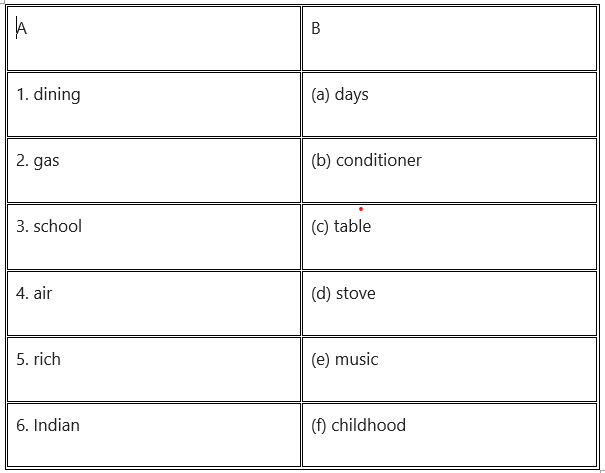
Answer:
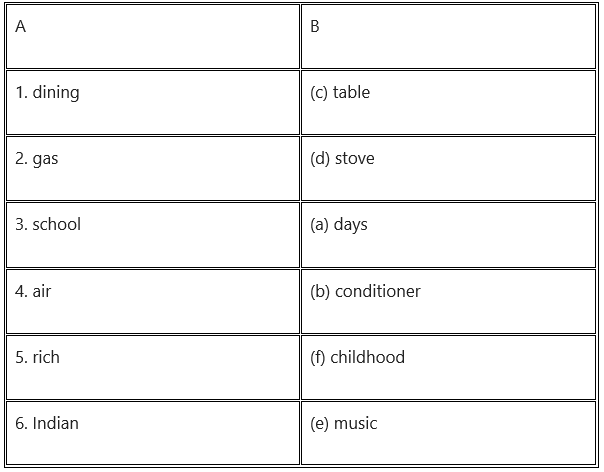
Question 3.
Choose the correct noun forms from those given in brackets:
- elegant (elegance/elegantly)
- solve (solving/solution)
- develop (developmental/development)
- logically (logical/logic)
- appear (appearance/apparently)
- including (inclusive/inclusion)
Answer:
- elegant – elegance
- solve – solution
- develop – development
- logically – logic
- appear – appearance
- including – inclusion
Question 4.
Write the verb forms of the following:
- maximum
- examination
- challenging
- beauty
- quickly
- admission
Answer:
- maximum – maximise
- examination – examine
- challenging – challenge
- beauty – beautify
- quickly – quicken
- admission – admit
Question 5.
Find out a word related to the game of cricket. List two meanings for it.
Answer:
Scoring:
1. general meaning: getting something
2. related to cricket: gaining runs
Question 6.
Guess the meaning of:
- inferiority complex
- sophisticated
- arrogant
Answer:
- inferiority complex – a feeling that you are not as good, as intelligent, as attractive, etc. as other people
- sophisticated – smart and polished
- arrogant – unpleasantly proud
Question 7.
Find out a word related to the game of cricket. List two meanings for it.
Answer:
Stumped: (Note: The word is not in the lesson but in the question on page 86)
1. general meaning : to be unable to answer a question or solve a problem because it is too difficult
2. related to cricket: being stumped is a method of dismissing a batsman.
Question 8.
Guess the meaning:
1. negotiate
2. at ease
Answer:
1. negotiate – to have formal discussions with someone in order to reach an agreement with them
2. at ease – comfortable.
Question 9.
Find the full forms of:
- IIT
- TFIR
- BARC
- TCP
- IP
Answer:
- IIT: Indian Institute of Technology
- TIFR: Tata Institute of Fundamental Research
- BARC: Bhabha Atomic Research Centre
- TCP: Transmission Control Protocol
- IP: Internet Protocol
Question 10.
Find the meaning of: anything under the sun
Answer:
anything under the sun-anything at all.
Question 11.
Find the full form of: GRE
Answer:
GRE – Graduate Record Examination
Question 12.
Match the following:
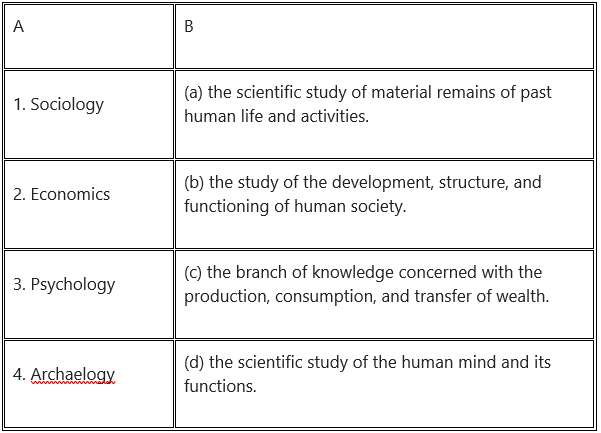
Answer:
- Sociology – the study of the development, structure, and functioning of human society.
- Economics – the branch of knowledge concerned with the production, consumption, and transfer of wealth.
- Psychology – the scientific study of the human mind and its functions.
- Archaelogy – the scientific study of material remains of past human life and activities.
Question 13.
From the extract find four words that form their antonyms by adding a prefix:
Answer:
- important × unimportant
- successful × unsuccessful
- possible × impossible
- written × unwritten
Question 14.
Write the past participles of:
- learn
- write
- change
- make
Answer:
- learn – learnt
- write – written
- change – changed
- make – made
Question 15.
Find out a word related to the game of cricket. List two meanings for it.
Answer:
target setting:
1. general meaning: deciding something that one hopes or intends to accomplish
2. related to cricket: deciding the number of runs to be achieved.
Question 16.
Give the adjective forms of the following:
- humanity
- rationality
- humility
- equality
- curiosity
- knowledge
Answer:
- humanity – humane
- rationality – rational
- humility – humble
- equality – equal
- curiosity – curious
- knowledge – knowledgeable
Non-Textual Grammar:
Do as directed:
Question 1.
To their astonishment they found a hissing snake stopping their way. (Rewrite using the verb form of the underlined word.)
Answer:
They were astonished to find a hissing snake stopping their way.
Question 2.
The minister spotted his cheerful face in the crowd and called out to him. (Rewrite using the present participle form of the verb ‘to spot’.)
Answer:
The minister, spotting his cheerful face in the crowd, called out to him./Spotting his cheerful face in the crowd, the minister called out to him.
Question 3.
He is a great king.
(Rewrite as an exclamatory sentence.)
Answer:
What a great king he is
Spot the error in the following sentences and rewrite them correctly:
Question 1.
Even though the laptop is expensive, but I wish to buy it for my mother.
Answer:
Even though the laptop is expensive, I wish to buy it for my mother.
Question 2.
The story should not exceed more than 800 words.
Answer:
The story should not exceed 800 words.